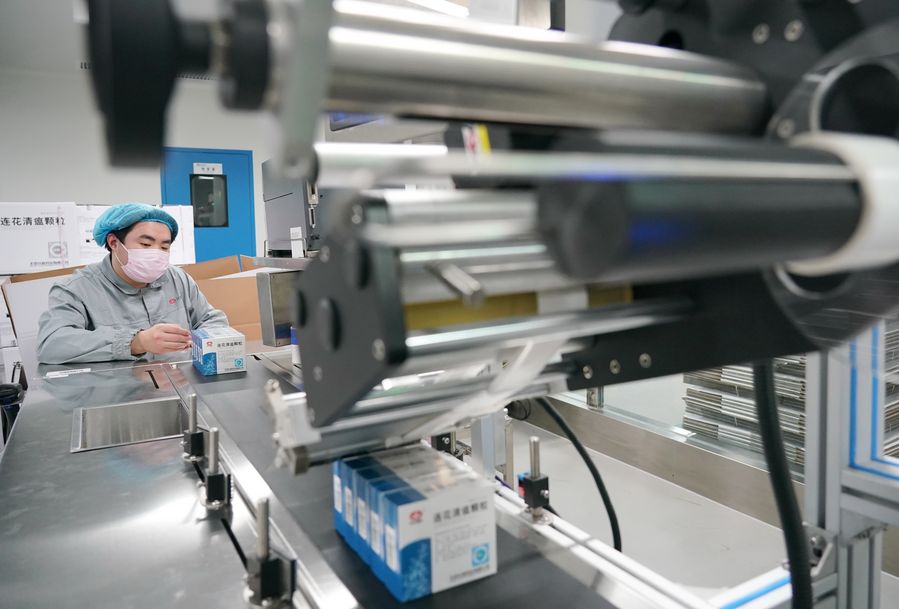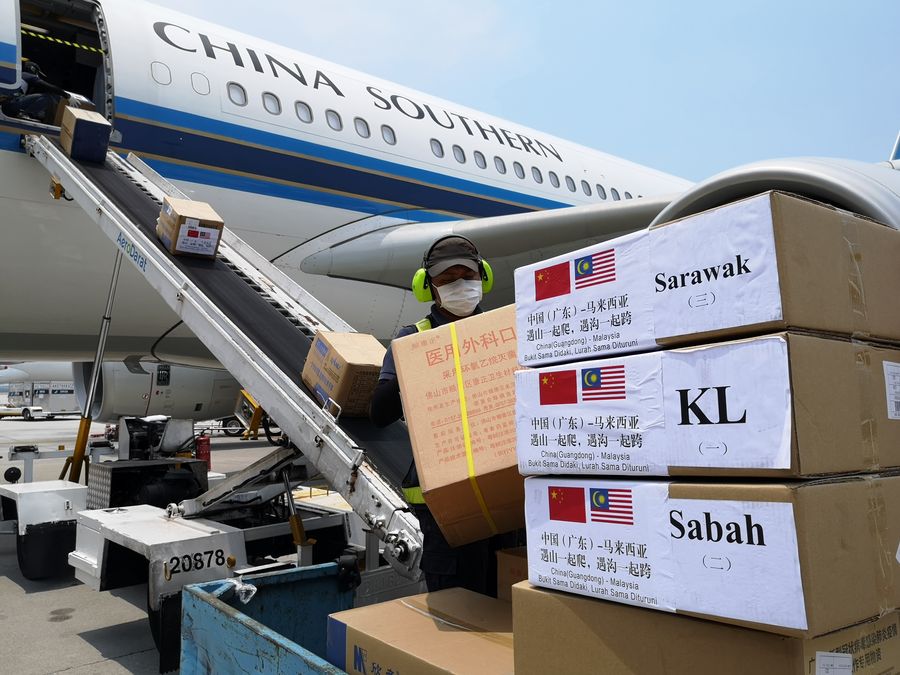-- The resumption of the China-Europe freight service, part of the cooperation under the BRI framework, acts as a lifeline of cross-border logistics amid the pandemic.
-- China's resumption of work and production also meet the basic demands of other countries for epidemic prevention.
-- Despite the impact of COVID-19, Chinese investment in Belt and Road partner countries increased by 11.7 percent in the first quarter and trade with them went up by 3.2 percent.
-- As the world economy is struggling to recover from the pandemic, China and other countries expect more results from the BRI cooperation and beyond.
BEIJING, May 26 (Xinhua) -- Near the Kazakh-Russian border in the Kostanay Region, a wind farm contracted by Chinese firm Universal Energy is under fully-fledged construction despite the impact of the raging novel coronavirus epidemic.
Hundreds of Chinese and Kazakh workers are binding reinforced steel bars to erect the wind farm's giant turbine foundations before early July.
The resumption of work at the wind farm, like many other cooperation projects under the Belt and Road Initiative (BRI), as well as production in China, will help dispel the shadow cast over the already sluggish global growth and boost the prospect, observers say.

A China-Europe freight train prepares to depart for Barcelona of Spain, in Xi'an, northwest China's Shaanxi Province, on April 8, 2020. (Xinhua/Li Yibo)
HOPE FOR GROWTH
As the second largest economy in the world, China has the largest industrial system with the most complete categories, strong production capabilities and complete supporting sectors. Its economic activities have gradually emerged from shutdowns by restarting production at factories and providing components, materials, as well as major subsystems to manufacturers worldwide.
Since mid-April, freight trains, under the operation of China Railway Express, have been shuttling between China's manufacturing hubs and cities in Europe and Central Asia.
On April 14, a Chinese freight train arrived in the western German city of Duisburg with over 160 tons of epidemic prevention supplies, as well as must-have goods for the resumption of work and production, such as auto parts, electronic products and optical fiber.
The resumption of the China-Europe freight service, part of the cooperation under the BRI framework, acts as a lifeline of cross-border logistics amid the pandemic.

A crane loads containers at the Manzhouli Railway Station in Manzhouli, a land port on the China-Russia border, north China's Inner Mongolia Autonomous Region, April 13, 2020. (Xinhua/Yu Jia)
Besides contribution to the stability of the global supply chain, China's resumption of work and production also meet the basic demands of other countries for epidemic prevention. Since the COVID-19 outbreak, China has exported medical supplies to 199 countries and regions, including aid to over 150 countries and international organizations.
In the Chinese capital, as of May 20, 370 enterprises and construction sites have resumed operations in Zhongguancun Science Park Daxing Bio-Medicine Industry Park.
Beijing Yiling Pharmaceutical Co., Ltd, the producer of Lianhua Qingwen Capsules -- an effective medicine recommended by China's National Health Commission for COVID-19 treatment -- is one of those enterprises. The daily output of the medicine has now increased to 660 cases, which can meet the daily demands of 440,000 patients.
Wu Rui, director of Beijing Yiling, said that the company has donated the medicine to Italy, Iraq, Bangladesh, Malaysia and other countries to help fight the epidemic.
Cai Fang, vice-president of the Chinese Academy of Social Sciences, said that China's economic recovery, boosted by strong policy support and growing domestic demand, will have a very positive spillover effect on the world.

A worker of Yiling Pharmaceutical works on the production line in Shijiazhuang, north China's Hebei Province, Feb. 17, 2020. (Xinhua/Yang Shiyao)
RESILIENT BRI
As more countries are moving to reopen their economies, global cooperation through multilateral platforms, such as BRI, has never been made so important.
While delivering the government work report at the third session of the 13th National People's Congress (NPC), the national legislature, on Friday, Chinese Premier Li Keqiang said the joint efforts to pursue the BRI have yielded fresh results, and emphasized the need to focus on high-quality joint building of the initiative.
Staying committed to achieving shared growth through consultation and collaboration, China will uphold market principles and international rules, give full scope to enterprises as the main actors, work with the BRI partners for mutually beneficial outcomes, and guide the healthy development of outbound investment, Li said.

Trucks transporting wind turbine blades for a wind farm contracted by Chinese firm Universal Energy in Kazakhstan's Kostanay Region, pass through the Guozigou bridge in northwest China's Xinjiang Uygur Autonomous Region on April 24, 2020. (Universal Energy/Handout via Xinhua)
"COVID-19 has affected Belt and Road cooperation to some extent, but the impact is temporary and limited," Chinese State Councilor and Foreign Minister Wang Yi said when answering questions from Chinese and foreign media on the sidelines of the ongoing NPC meeting on Sunday.
"From an overall and long-term perspective, COVID-19 will only strengthen and re-energize Belt and Road cooperation and open up new possibilities," said Wang.
Despite the impact of COVID-19, Chinese investment in Belt and Road partner countries increased by 11.7 percent in the first quarter and trade with them went up by 3.2 percent, he added.
According to data from China's General Administration of Customs, China's foreign trade with countries along the Belt and Road totaled 2.07 trillion yuan (301.1 billion U.S. dollars) in the first three months of this year.
The resumption of construction for a number of projects suspended due to COVID-19 will generate strong impetus for the host countries' efforts to beat the virus and revitalize the economy, said Wang.
CALL FOR COOPERATION
As the world economy is struggling to recover from the pandemic, China and other countries expect more results from the BRI cooperation and beyond.
Built on its real benefits to the people in partner countries, Belt and Road cooperation has enabled documents to be signed with 138 countries over the past seven years, with more than 2,000 projects launched and tens of thousands of jobs created in the partner countries.
"It is vital and it will continue despite the ongoing pandemic. China's policies are based on continuity and this is also the case for the BRI," said George Tzogopoulos, an expert on Chinese affairs with the Begin-Sadat Center for Strategic Studies at Israel's Bar Ilan University.

A worker unloads medical supplies brought by a medical team from China to Malaysia at Kuala Lumpur International Airport, Malaysia, April 18, 2020. (Chinese Embassy in Malaysia/Handout via Xinhua)
Pierre Khoury, vice president of the Arab Chinese Cooperation and Development Association, called for enhanced cooperation between China and Arab countries to overcome the challenges brought by the COVID-19 pandemic.
"Let's remember that the core value behind the Belt and Road Initiative is this 'win-win' relationship," he said.
"By aiming for high-standard, people-centered and sustainable progress, we will make the Belt and Road a model of development, cooperation and health for all involved," said the Chinese foreign minister.
"The darkest time will pass, and the light is ahead," Wang said.
(Video reporters: Zhao Yuchao, Han Chong, Pan Geping; Video editor: Zheng Xin)■



